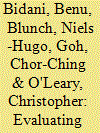| Srl | Item |
| 1 |
ID:
086212


|
|
|
|
|
| Publication |
2009.
|
| Summary/Abstract |
Recent years have seen a surge in work on the impacts of active labor market programs for numerous countries. However, little evidence has been presented on the effectiveness of such programs in China. Recent economic reforms, associated with massive lay-offs, and the accompanying public retraining programs make China fertile ground for rigorous impact evaluations. This study uses survey data from the two large industrial cities Shenyang and Wuhan, covering the period 1998 to 2000, to evaluate retraining programs for over 2000 workers two years after they had been observed as displaced and unemployed. Using a comparison group design, this study is, to our knowledge, the first evaluation of its kind in China. The evidence suggests that retraining helped workers find jobs in Wuhan, but had little effect in Shenyang. The study raises questions about the overall effectiveness of retraining expenditures, and it offers some directions for policy-makers about future interventions to help laid-off workers.
|
|
|
|
|
|
|
|
|
|
|
|
|
|
|
|
| 2 |
ID:
103989


|
|
|
|
|
| Publication |
2011.
|
| Summary/Abstract |
The lack of official government attention to Japanese war crimes during the Mao years has been widely acknowledged. Yet in the summer of 1956, years of preparatory work by Zhou Enlai culminated in the little-known and summarily dismissed trials of 1,062 self-confessed Japanese war criminals in Shenyang and Taiyuan. The extraordinarily lenient sentences given to 45 of the worst offenders - and wholesale pardons of 1,017 - were prompted by larger geopolitical considerations that effectively hamstrung PRC authorities from bringing the trials into closer alignment with previous ones in Europe and Japan. Zhou's determination to adopt a "policy of leniency" towards the Japanese prisoners, however, was sorely at odds with the sentiments of the general public. The need to prepare the people for a counterintuitive mass clemency saw a sudden and drastic shift in media discourse in 1954, followed by a series of remarkable cultural and intellectual campaigns that were designed to persuade the Chinese people that they should henceforth let bygones be bygones.
|
|
|
|
|
|
|
|
|
|
|
|
|
|
|
|